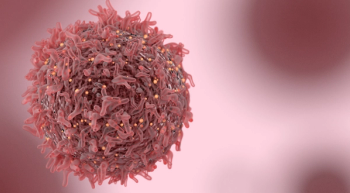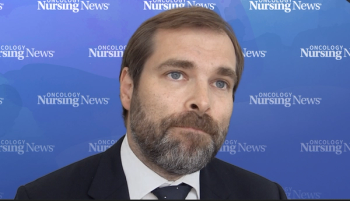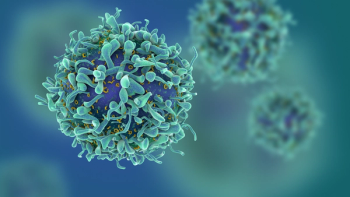
Patients with metastatic castration-resistant prostate cancer who received radium-223 prior to docetaxel had better quality of life and tolerability scores than those who received docetaxel first.

Patients with metastatic castration-resistant prostate cancer who received radium-223 prior to docetaxel had better quality of life and tolerability scores than those who received docetaxel first.

Adagrasib outperformed docetaxel in patients with KRAS G12C-mutated non–small cell lung cancer, regardless of baseline brain metastases.

Earlier switch to atezolizumab after run-in with vemurafenib plus cobimetinib showed promise in improving OS rates in BRAF V600–positive melanoma.

Guiding treatment via response predictive subtype could be beneficial for identifying patients with high-risk breast cancer who may respond to Dato-DXd plus durvalumab.

Pembrolizumab led to improved survival over ipilimumab in patients with unresectable advanced melanoma, according to long-term data.

NKT2152, a novel HIF2a inhibitor, demonstrates significant efficacy in patients with advanced clear cell renal cell carcinoma.

Trastuzumab deruxtecan improved time to deterioration for pain and other categories, in patients with HER2 low/ultralow breast cancer.

Nivolumab, given with or without ipilimumab, showed durable 10-year survival outcomes in patients with advanced melanoma.

Breastfeeding is feasible for patients with hormone receptor–positive breast cancer who are undergoing a break of endocrine therapy.

Datopotamab deruxtecan(Dato-DXd) demonstrated antitumor activity in patients with advanced/metastatic ovarian or endometrial cancer who had prior chemotherapy treatment.

Zipalertinib was safe and effective for heavily pretreated patients NSCLC harboring EGFR exon 20 insertion mutations who progressed on or after amivantamab.

Amivantamab plus chemotherapy delivered promising OS trends compared with chemotherapy in EGFR-mutant advanced non-small cell lung cancer after disease progression on osimertinib.

While none of the experimental combinations met efficacy targets, durvalumab with monalizumab and ceralasertib showed promising long-term benefits in patients with advanced NSCLC.

The duo of TAR-200 and cetrelimab was safe and efficacious in the neoadjuvant setting for certain patients with muscle-invasive bladder cancer.

Adding relatlimab to nivolumab and chemotherapy improved efficacy but did not increase safety concerns in advanced-stage lung cancer.

For patients with early breast cancer, hypofractionated radiation was noninferior to normofractionated radiation regarding lymphedema risk.

Presurgical durvalumab plus chemotherapy, followed by adjuvant durvalumab, led to improved survival in patients with cisplatin-eligible muscle-invasive bladder cancer (MIBC).

Patients with early-stage triple-negative breast cancer tended to have improved survival with neoadjuvant pembrolizumab plus chemo followed by adjuvant pembrolizumab.

Patients with Claudin-6–positive advanced solid tumors, including platinum-resistant ovarian cancer, tended to respond to therapy with TORL-1-23

While adjuvant pembrolizumab and chemotherapy with or without radiation did not boost DFS in the overall high-risk endometrial cancer population, but showed a trend toward improved DFS in one patient subgroup.

Retifanlimab plus carboplatin and paclitaxel boosted PFS for certain patients with recurrent or metastatic SCAC.

The addition of radium-223 to enzalutamide led to significant rPFS and OS benefits compared to enzalutamide alone in metastatic castration-resistant prostate cancer.

Lenvatinib, pembrolizumab, and TACE outperformed placebo plus TACE in progression-free survival for intermediate-stage hepatocellular carcinoma.

Pembrolizumab plus chemoradiotherapy improved survival in patients with previously untreated, high-risk locally advanced cervical cancer.

The addition of BMS-986012 to frontline nivolumab and chemotherapy led to promising outcomes in patients with extensive-stage small cell lung cancer.

Consolidation durvalumab improved survival across subgroups of patients with limited-stage small cell lung cancer based on factors associated with prior prophylactic cranial irradiation and concurrent chemoradiotherapy use.

Study findings support tivozanib monotherapy for second-line treatment of certain patients with metastatic RCC, an expert said.

DESTINY-Breast12 results showed that T-DXd led to overall and intracranial activity in patients with HER2-positive metastatic breast cancer.

Belzutifan improved progression-free survival and objective response rate compared to everolimus in previously treated advanced renal cell carcinoma.

Adjuvant durvalumab failed to improve disease-free survival in resected EGFR- or ALK-negative non-small cell lung cancer.